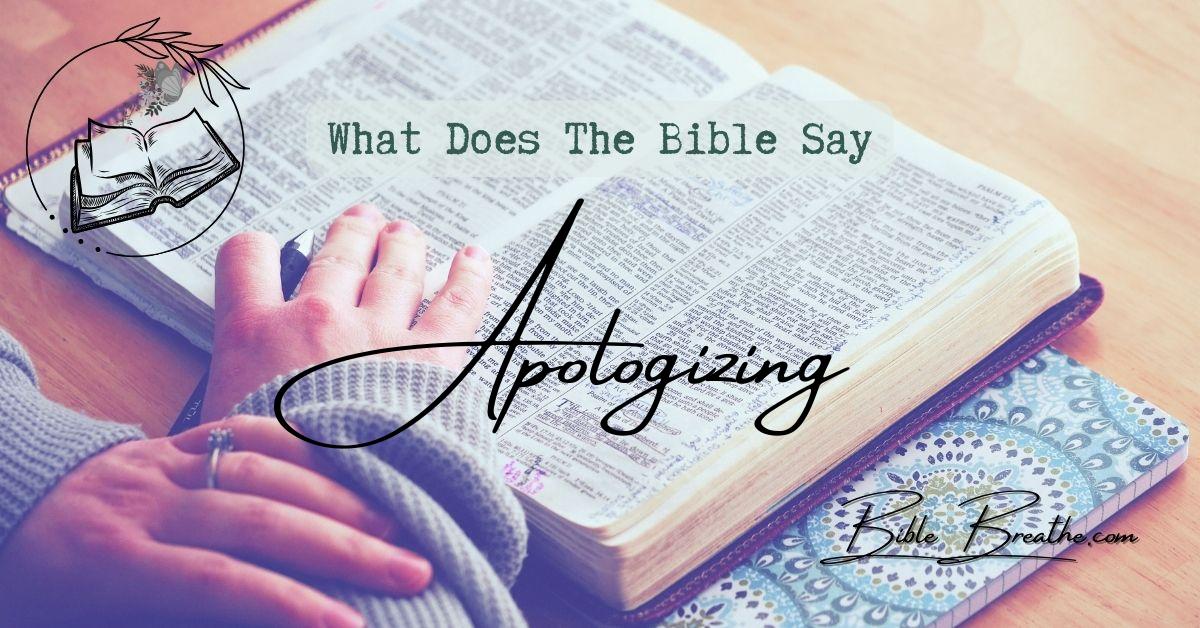What’s the Bible’s take on apologizing, fam?
You might think it’s just saying, “I’m sorry,” but there’s more to it in the Word.
We’re breaking it down!
So, there’s this misconception about “I’m sorry” in the Bible, but it’s more profound.
It’s about repentance, forgiveness, and true reconciliation.
Picture it like fixing a broken puzzle, putting those pieces back together.
In the biblical context, it’s all about showing some humble heart and being a peacemaker.
The Bible’s got tons to say about confession and seeking forgiveness for our wrongs.
It’s like a spiritual reset button.
We’ll talk about atonement, redemption, and the grace that flows through a genuine apology.
Think of it as a fresh start, a new beginning, and a chance to rebuild bridges.
Join us in this journey towards forgiveness, fam.
It’s a powerful story of transformation, just like the prodigal son.
🙏📖
Key Takeaways
- The Bible stresses the importance of humility, confession, and repentance as essential elements of offering a genuine apology.
- Apologizing sincerely and acknowledging one’s faults or wrongdoings can pave the way for reconciliation, fostering peace and healing in relationships.
- Scripture encourages believers to seek forgiveness and extend apologies when they have wronged others, promoting a culture of compassion, understanding, and forgiveness.
- A true apology is not just about uttering words; it involves genuine remorse and a commitment to change, demonstrating a transformation in behavior and actions.
- Through heartfelt apologies and repentance, individuals can restore broken relationships, demonstrating God’s love, grace, and the transformative power of forgiveness.
- Understanding and embodying the biblical principles of apologizing contribute to personal growth, stronger relationships, and a more compassionate and empathetic society, reflecting the teachings of Jesus Christ.
The Heartfelt Art of Apologizing in the Bible
Photo modified by BibleBreathe.com. Original photo by Anete Lusina on Pexels
Apologizing, my friends, is like tending to a garden.
It’s not just about saying sorry; it’s about nurturing the soil of humility and seeking the blooming flowers of forgiveness.
Let’s dive into the Bible and see what it teaches us about this vital act.
The Beauty of Humility
Apologizing is a humble admission that we, as flawed human beings, can stumble on this journey called life.
And you know what?
Humility is like music to God’s ears.
It’s that sweet melody that resonates with His heart.
The book of Proverbs drops some wisdom on us:
“Pride goes before destruction, a haughty spirit before a fall.” – Proverbs 16:18 (KJV)
Pride can be a roadblock to saying those two simple words, “I’m sorry.”
But when we humble ourselves, admitting our faults, we start walking the path of righteousness.
Scriptures That Sing of Humble Forgiveness
The Bible doesn’t just whisper about humility; it sings it loud and clear.
In the book of James, it says:
“Therefore confess your sins to each other and pray for each other so that you may be healed.” – James 5:16a (KJV)
Confessing our sins and seeking forgiveness isn’t just about fixing relationships; it’s like a healing balm for our souls.
It’s about recognizing our shortcomings and working on becoming better.
Apologizing isn’t just lip service; it’s about a genuine desire to make things right.
When we apologize with a sincere heart, we’re walking in the footsteps of Jesus, promoting reconciliation, and experiencing the grace of God in our lives.
In a nutshell, the Bible encourages us to apologize with humility, to admit our mistakes, and to seek forgiveness.
It’s about following the teachings of Christ, fostering reconciliation, and finding God‘s grace in our relationships with others and with Him.
The Art of Apology: A Biblical Perspective
Photo modified by BibleBreathe.com. Original photo by Anastasia Shuraeva on Pexels
Hey there, my friends!
You know, on this journey of faith, we all take a tumble or two along the way.
We find ourselves off the righteous path, and that’s when we need to tap into the wisdom of the Bible to understand how to apologize and seek reconciliation.
Confession: Turning on the Light
If we confess our sins, he is faithful and just to forgive us our sins, and to cleanse us from all unrighteousness.” – 1 John 1:9 (KJV)
Confession is like flipping the switch in a dark room.
It shines a light on our hidden wrongdoings and allows us to face our mistakes head-on.
It’s about being humble, admitting when we’ve messed up, and asking for forgiveness.
The Bible makes it clear that self-reflection and taking responsibility for our actions are essential.
It encourages us to own up to our transgressions and seek forgiveness.
The Power of Forgiveness
For if ye forgive men their trespasses, your heavenly Father will also forgive you.” – Matthew 6:14 (KJV)
Now, my friends, forgiveness isn’t a one-way street in God’s book.
It’s a two-way bridge that we construct with sincere apologies and reconciliation.
Just as we seek forgiveness from God, we’re also called to forgive others.
Picture this: it’s like gathering the shattered pieces of a broken vase and carefully putting them back together.
Sure, there might be some scars, but it becomes whole again.
In essence, the Bible teaches us that apologizing is an act of humility.
It’s an acknowledgment of our imperfections, a crucial step toward reconciliation.
It’s all about restoring harmony, embracing grace, and living out the core principles of love and forgiveness that are at the heart of the Christian faith.
So, my friends, let’s embrace the art of apology and reconciliation on our journey of faith!
Beyond Apologies: The Heartfelt Transformation
Photo modified by BibleBreathe.com. Original photo by cottonbro studio on Pexels
Repentance, my friends, is like remodeling a house.
It’s not just a fresh coat of paint; it’s tearing down the old and building something new.
Let’s dive into the Bible and explore the profound concept of repentance, which goes beyond a simple apology.
Going Deeper: Apology vs. Repentance
Apologizing is like dipping your toes into the water, but repentance?
That’s a full-on dive into the deep end.
When you apologize, you might be sorry for the mess you made, but true repentance?
It’s about recognizing that your actions weren’t just a little hiccup; they were a detour from the path of righteousness.
The Psalms put it beautifully:
“The sacrifices of God are a broken spirit: a broken and a contrite heart, O God, thou wilt not despise.” – Psalm 51:17 (KJV)
Repentance isn’t just saying sorry; it’s about having a heart that’s willing to change and get back on track.
The Turning Point: Repentance in Action
Repentance means turning away from those wrong turns we’ve taken in life and heading back toward God’s loving embrace.
In the book of Acts, Peter delivers a powerful message:
“Repent ye therefore, and be converted, that your sins may be blotted out, when the times of refreshing shall come from the presence of the Lord.” – Acts 3:19 (KJV)
This isn’t just a casual apology; it’s a life-altering decision to change our ways and get right with God.
It’s like hitting the reset button on our spiritual journey.
In a nutshell, true repentance isn’t just about saying sorry; it’s about recognizing our wrongs, having a burning desire to change, and turning back to God for forgiveness and guidance.
It’s through this transformation that we experience the grace, mercy, and redemption that the Bible so beautifully describes.
Extending Olive Branches: Apologizing for Peace
Photo modified by BibleBreathe.com. Original photo by Brett Jordan on Pexels
Hey there, friends!
Today, let’s dive into the biblical wisdom about apologizing and how it weaves into the tapestry of peacemaking.
The Bible’s Call to Be Peacemakers
Blessed are the peacemakers, for they will be called children of God.” – Matthew 5:9 (KJV)
You see, apologizing is like extending an olive branch—a sincere gesture to make peace.
The Bible encourages us not just to passively wish for peace but to actively seek it out and be peacemakers.
Apology, when genuine, is an embodiment of humility, a stepping stone toward harmony and understanding.
Think of it like a stormy sea that calms down after a tempest.
Apologizing, with its threads of repentance and forgiveness, has the power to quiet even the fieriest emotional storms, bringing back tranquility and fostering unity.
Blessings of Peacemaking
“Depart from evil, and do good; seek peace, and pursue it.” – Psalm 34:14 (KJV)
When we seek and offer sincere apologies, we receive a double blessing.
First, we mend what’s broken, healing relationships.
Second, we nurture inner peace within ourselves.
You could say it’s like planting seeds of empathy and understanding, and in return, we reap a bountiful harvest of harmony and stronger bonds.
In a world often marked by conflicts, a genuine apology shines as a beacon of hope.
It’s a courageous act, a sign of strength in acknowledging our wrongs, and an invitation to rebuild what was shaken.
In conclusion, the Bible invites us to embrace the art of apologizing as a means of making peace.
It highlights the beauty of healing rifts, nurturing relationships, and spreading peace in a world that’s hungry for understanding and compassion.
So, my friends, let’s be peacemakers through the act of sincere apology!
Lessons from Biblical Apologies: Finding Forgiveness and Redemption
Photo modified by BibleBreathe.com. Original photo by Alex Green on Pexels
The Bible, my friends, isn’t just a book of rules; it’s a collection of stories that teach us about life, including the art of apologizing, seeking forgiveness, and the incredible power of true repentance.
Let’s delve into these biblical narratives to uncover the gems of wisdom they hold.
Learning from Those Who Sought Forgiveness
- David’s Heartfelt Confession:
David, a man after God’s own heart, made a grave mistake with Bathsheba.
But when the prophet Nathan confronted him, David didn’t dodge the issue.
He owned up to it and said to God:
“I have sinned against the Lord.” – 2 Samuel 12:13a (KJV)
- The Prodigal Son’s Humble Return:
There’s also the story of the prodigal son, a young man who messed up royally.
Yet, he swallowed his pride and went back to his father, saying:
“Father, I have sinned against heaven, and in thy sight, and am no more worthy to be called thy son.” – Luke 15:21 (KJV)
The Lessons We Can Draw
- David’s Genuine Repentance:
David’s heartfelt apology didn’t erase the consequences of his actions, but it did bring him God’s forgiveness.
It shows us that when we genuinely repent, God’s grace and mercy are there for us, even when we have to face earthly consequences.
- The Prodigal Son’s Redemption:
The prodigal son’s humble apology didn’t just mend his relationship with his father; it led to a grand celebration.
This story reminds us of God’s boundless mercy and the joyous reconciliation that follows true repentance.
These stories, my friends, teach us about the transformative power of a heartfelt apology.
They remind us of the importance of humility, owning up to our mistakes, seeking reconciliation, and embracing the grace and redemption that come with genuine repentance.
In a nutshell, the Bible isn’t just about ancient history; it’s a guide for our lives today, showing us that when we seek forgiveness with sincerity, we can find redemption and grace beyond measure.
Navigating the Path of Apology: A Biblical Roadmap
Photo modified by BibleBreathe.com. Original photo by Suzy Hazelwood on Pexels
Hello, dear friends!
In the intricate tapestry of life, offering a heartfelt apology is like weaving an essential thread, and the wisdom for this is deeply rooted in the Bible.
The Scriptural Foundation of Apology
“Therefore, if you are offering your gift at the altar and there remember that your brother or sister has something against you, leave your gift there in front of the altar. First go and be reconciled to them; then come and offer your gift.” – Matthew 5:23-24 (KJV)
The Bible lights up the path of reconciliation, emphasizing the importance of resolving conflicts and seeking forgiveness before approaching the Divine.
It reminds us that true worship is entwined with relationships restored through heartfelt apologies.
A Guide to Offering a Genuine Apology
- Sincere Acknowledgment: Start by recognizing your mistake and its impact. A genuine apology begins with owning up to your wrongdoing.
- Express Regret and Remorse: Let genuine sorrow for the hurt caused shine through. Let empathy and compassion lead your words.
- Make Amends: Take practical steps to make things right. Remember, actions often speak louder than words.
- Commit to Change: Show a sincere desire to change and avoid repeating the same mistake.
The Power of Apology and True Repentance
“For I will forgive their wickedness and will remember their sins no more.” – Hebrews 8:12 (KJV)
Remember, friends, apologizing goes beyond mere words.
It’s about transformation within ourselves and in our relationships.
It’s like lifting a heavy burden, allowing us to walk freely once more.
When we apologize and genuinely repent for our wrongdoings, we experience this liberation, enabling us to step into a future unburdened by past mistakes.
In closing, the Bible teaches us that apologizing is a divine art—an act of humility, empathy, and courage.
It’s a testament to our growth and a bridge toward harmonious relationships.
By following these biblical principles, we not only honor God’s teachings but also cultivate a more compassionate and forgiving world.
So, my dear friends, let’s embrace the path of apology as we journey through life’s tapestry together!
Frequently Asked Questions (FAQs) About What Does The Bible Say About Apologizing
Are the exact words “I’m sorry” mentioned in the Bible?
The exact phrase ‘I’m sorry’ is not found in the Bible, but it does teach about repentance, seeking forgiveness, and reconciling with others.
Why is repentance important in the context of apologizing?
Repentance is vital as it involves acknowledging one’s wrongdoings, seeking forgiveness, and making amends, aligning with the biblical principle of seeking reconciliation and spiritual growth.
How does the Bible differentiate between worldly sorrow and godly sorrow?
The Bible distinguishes between worldly sorrow, leading to despair or hopelessness, and godly sorrow, resulting in repentance.
2 Corinthians 7:10 explains that godly sorrow leads to salvation without regret, while worldly sorrow lacks genuine transformation and may lead to spiritual death.







